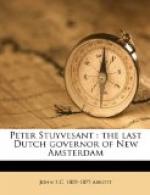“Although it is our cordial desire that similar and other sectarians may not be found there, yet, as the contrary seems to be the fact, we doubt very much whether vigorous proceedings against them ought not to be discontinued; unless indeed, you intend to check and destroy your population, which, in the youth of your existence, ought rather to be encouraged by all possible means.
“Wherefore it is our opinion that some connivance is useful, and that at least the consciences of men, ought to remain free and unshackled. Let every one remain free so long as he is modest, irreproachable in his political conduct, and so long as he does not offend others or oppose the government. This maxim of moderation has always been the guide of our magistrates in this city. The consequence has been that people have flocked from every land to this asylum. Tread thus in their steps and we doubt not you will be blessed.”
From this time persecution ceased in New Netherland. Either Governor Stuyvesant was convinced by the argument in the above dispatch, or he was intimidated by his rebuke. After two years of absence John Brown returned to New Netherland, and it is said that the governor received him as though he were ashamed of what he had done.
The year 1663 was a year of many disasters. Early in the year an earthquake shook severely the whole of New Netherland and of the adjacent regions. The melting of the snow in the spring, and the falling rains caused a desolating freshet, which inundated all the meadow lands of the rivers, utterly destroying the crops. This calamity was followed by the small-pox, which spread with a like rapidity and fatality among the Europeans and the Indians. Of the Iroquois Indians over a thousand died. In addition to these calamities came, worst of all, war with its indescribable horrors.
At Esopus the hand of industry had been very successfully employed. Quite a crowded population filled the houses, within the palisades, and the rapidly increasing numbers had rendered it necessary to commence another village, which was called Wildwyck, on a fertile plain at a little distance from the fort. Under the blessings of peace, wealth had increased. The church numbered sixty members. Most of the garrison had been withdrawn as no longer needed.
But the Indians could not forget their brethren sent to life-long slavery at Curacoa. It was increasingly evident that the peace, into which they had entered, was not cordial. It was a compulsory peace. An unendurable outrage had driven them into the war. And by the terms of peace, while they had been compelled to return all the captives they held, fifteen of their warriors were doomed to perpetual slavery.
Murmurings were heard which foreboded an outbreak. Some of the settlers became alarmed and communicated their fears to Governor Stuyvesant. He sent word that he would soon visit Esopus, to investigate the state of affairs. The Indian chiefs, hearing of this, returned the message, that if he were coming to renew their treaty of friendship they should expect him to come unarmed and they would be happy to meet him in council, according to their custom, in the open field outside of the gate.




